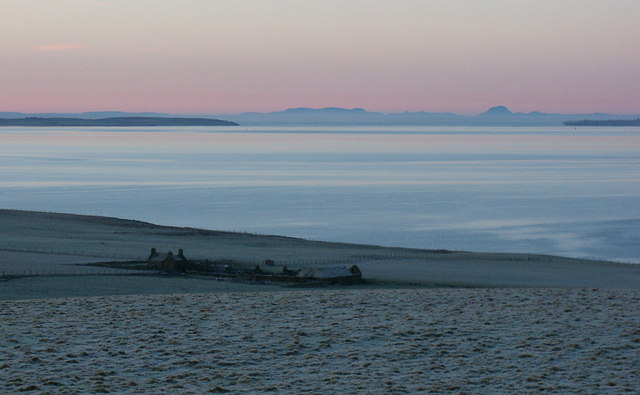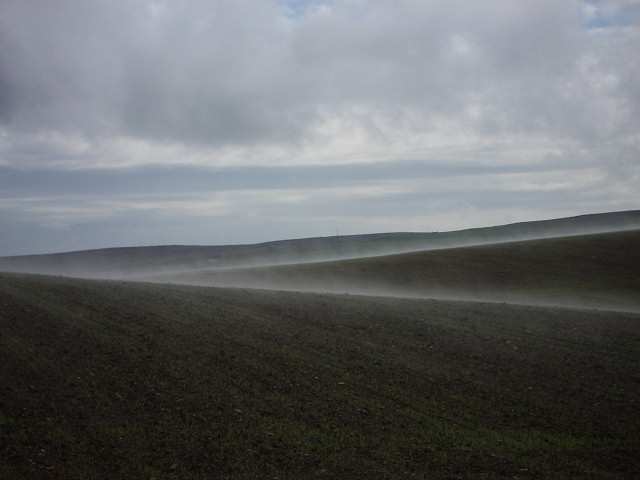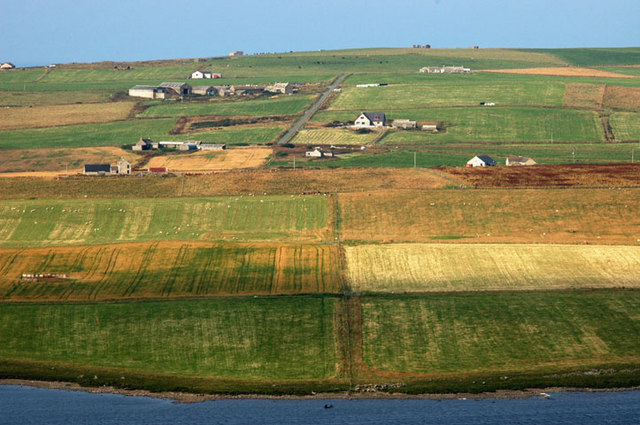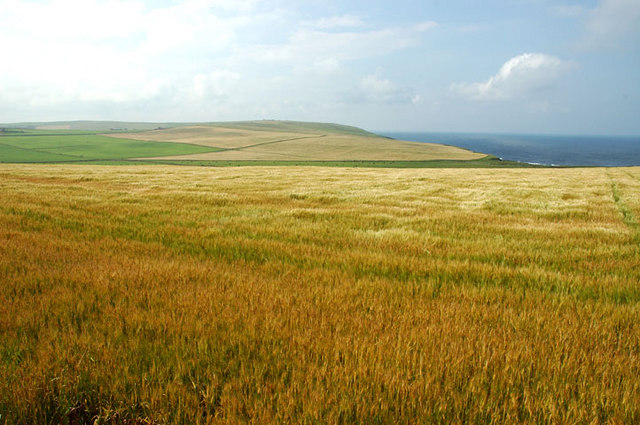This bloody town's a bloody cussBloody Orkney: this traditional song has been attributed to a Captain Hamish Blair, RN, said to have been stationed at Scapa Flow during WWII; variant stanzas include a riposte from the local citizenry:
No bloody trains, no bloody bus,
And no one cares for bloody us
In bloody Orkney.
The bloody roads are bloody bad,
The bloody folks are bloody mad,
They'd make the brightest bloody sad,
In bloody Orkney.
All bloody clouds, and bloody rains,
No bloody kerbs, no bloody drains,
The Council's got no bloody brains,
In bloody Orkney.
Everything's so bloody dear,
A bloody bob, for bloody beer,
And is it good? -- no bloody fear,
In bloody Orkney.
The bloody 'flicks' are bloody old,
The bloody seats are bloody cold,
You can't get in for bloody gold
In bloody Orkney.
The bloody dances make you smile,
The bloody band is bloody vile,
It only cramps your bloody style,
In bloody Orkney.
No bloody sport, no bloody games,
No bloody fun, the bloody dames
Won't even give their bloody names
In bloody Orkney.
Best bloody place is bloody bed,
With bloody ice on bloody head,
You might as well be bloody dead,
In bloody Orkney.
There's nothing greets your bloody eye
But bloody sea and bloody sky,
'Roll on demob!' we bloody cry
In bloody Orkney.
Captain Hamish 'Bloody' Blair
Isna posted here nae mare
But no-one seems to bloody care
In bloody Orkney.

A view over the farm of Biggings towards Hoy and Stromness, Orkney: photo by John Ireland, 20 January 2007

Deepdale Farm, Scapa Flow and Scottish mainland to the south, viewed from Orkney: photo by Ian Balcombe, 31 January 2006
Farm and lands at Cleat, Westray, Orkney: photo by Isla17, 13 July 2007
Barley crop ready to be cut, Upper Sanday, Toab, Orkney (island bird reserve of Copinsay seen in background): photo by Mark Crook, 2 August 2003
Warthill, hilltop farm in East Holm, Orkney: photo by Karl Cooper, 28 February 2006
Heath on coastal terrace, Hobbister RSPB Reserve, Orkney: photo by C Michael Hogan, 9 July 2007










Bloody Orkney
ReplyDeleteOn the other hand, Orkney looks beautiful to me.
ReplyDeleteBTW, these verses were variously recycled during WWII, in different idioms, to fit different places. E.g.:
This fucking town's a fucking cuss
No fucking trams, no fucking bus.
Nobody cares for fucking us
In fucking Halkirk.
No fucking sport, no fucking games,
No fucking fun, the fucking dames
Won't even give their fucking names
In fucking Halkirk.
Bloody beautiful!
ReplyDeleteTom, do you know any recorded renditions?
Don
Don,
ReplyDeleteThat link I've given above is a good one: Bloody Orkney performed by the Ian Campbell Folk Group.
Here's another World War II-era song (to the tune of Lili Marlene) covered by the same artist(s):
Ian Campbell Folk Group: The D-Day Dodgers
Ian Campbell (b. Aberdeen Scotland 1933) was a mainstay of the English folk scene in the 1960s, when I was living "over there".
The band became a breeding ground and schoolhouse for players in the British folk revival. Dave Swarbrick, the great string player (who went on to Fairport Convention), does the work on mandolin and fiddle. Sweet.
Tom,
ReplyDeleteThe song makes it sound a bit grim but the pictures tell a somewhat different story -- looks beautiful to me too, laddie, a place after my own heart.
3.12
light coming into sky above still black
ridge, waning moon across from branches
in foreground, wave sounding in channel
idea for portraits on paper,
did not mention after
presence itself, of what is
present, such as that
grey rain cloud against plane of ridge,
shadowed green pine on tip of sandspit
Don.
ReplyDeleteYou've tempted me to follow that bloody strand round the bloody block, remembering Dave Swarbrick left the Campbell group after being called upon by Joe Boyd to do the violin overdub on the epic Fairport track A Sailor's Life. History.
(A poem I spun out of that song's title in 1972 or so made its way into When Things Get Tough on Easy Street, an early Selected Poems.)
Steve,
ReplyDeleteOur bloody comments crossed...
But I've just been thinking of you, and your sea-captain mate, while viewing the splendid collection of maritime pictures in that last link (A Sailor's Life).
Some great shots in there of men of the Royal Navy at Scapa Flow, though of a generation (and a war) before Cap'n Hamish Blair's.
Don, both of the Ian Campbell cuts I've linked to come from the terrific 1965 Transatlantic LP Contemporary Campbells.
ReplyDeleteA collection of classics!
The contents:
Marilyn Monroe (Sydney Carter/Rory McEwen); Dirty Old Town (Ewan MacColl); Thirty Foot Trailer (Ewan MacColl); My Donal (Owen Hand); Battle of the Somme (PM Robertson); Hard Life on the Cut (Ian Campbell); Net Hauling Song (Ewan MacColl); Death Come Easy (Harvey Andrews); Rights of Man (trad); Liverpool Lullaby (Stan Kelly); Four Pounds a Day (Stan Kelly); The Dove (trad); Bloody Orkney (trad); The D-Day Dodgers (Hamish Henderson).
The lineup: Ian Campbell (vocal), Lorna Campbell (vocal), Brian Clark (guitar, vocal), Dave Swarbrick (fiddle, mandolin) and John Dunkerley (banjo, autoharp)
Very cool, all of it. First smile I've had all day, so thanks for that. Curtis
ReplyDeleteBloody fun, these are, if I dare say so . . .
ReplyDeleteIf you use Spotify, I would highly recommend you give this one a listen. The recording of this song, amongst nearly all the others, are brilliant.
ReplyDeleteMany Scots never think to visit the Orkney or Hebridean Islands they seem so remote The accents are different up that way too and the voices have more of a lilt or a song in them Performing music is very important as entertainment My mum would take trips up to the northern mainland to play folk music on her accordian There was no shortage of venues or accompaniment In her 70's she would play into the wee hours
ReplyDeleteI've never visited the islands to the north but I plan to in the next few years
Can only surmise that Hamish was not a nature lover??!!! If he was there in the winter it could have been bloody miserable though
I’ve been a long time fan of Bert Jansch’s playing Folk Revival enthusiasts might like the Documentary ‘Acoustic Routes’ which was posted on U-Tube for a while?? But there is a selection there to listen to including some from his time with ‘Pentangle’ Bert died recently but was a big influence on many players through the 60’s and on A really modest and talented man Colin
ReplyDeleteBeautiful it is, judging from the photos and one would have to be bloody insensitive not to see it but on the other hand........Hamish Blair does seem to have something going for him there!
ReplyDeleteIt's so bloody wet and cold and miserable in this bloody town right now that I'd look upon bloody Orkney as a bloody tropical resort.
ReplyDeleteAt least in lovely bloody Orkney shivering bodies bundled in bloody rags do not occupy every bloody shop doorway, and that would be a start.
But on a more pleasant note -- in fact many more pleasant notes and chords and time signatures...
dal9, thanks for the musical reminder. Extremely moving to slither down memory lane with the brilliant Bert Jansch, b. Glasgow 1943, the Bach of fingerstyle guitar. Hearing of his passing a few months back was a blow, though at this stage of the game, the bloody blows just keep on coming.
In the years I spent in and out of London in the early and mid sixties Bert was a familiar figure in the folk clubs and otherwise. He was living in Kilburn then, one saw him out and about. He remains the greatest guitar player I've ever heard. Indeed, it was examining his work that helped instill the modesty that caused me to put down that instrument forever.
Back then he was thought of, and sometimes seen with, a gal from Notts named Anne Briggs. I believe it was from her that he learned much of the traditional folk ballad repertoire. For old times' sake, here are a few Jansch performances of folk standards which I believe he learned from her.
Bert Jansch: Black Waterside
Anne Briggs: Blackwaterside
Bert Jansch (1943-2011): She Moved Through the Fair
Anne Briggs: She Moved Through the Fair (1963)
Oh, and not forgetting another vein of song, with which Hamish Blair, if in fact he ever existed, would have perhaps been familiar (Brad, thank you for the prompt on this):
Sods Opera: I haven't seen old Hitler for a hell of a time
Tom,
ReplyDeleteAye, matey, that song and those pictures taketh me heart clear away -- time to go down to the channel and cool off.
looks like home. not one i've known but one i've been.
ReplyDeleteBrought to mind Edwin Muir's autobiography and the tragedies that befell his family once they were evicted from their tenant farm and settled in Glasgow at a time when the city was rife with pollution of all kinds. Thank you, TC.
ReplyDeleteThe Orcadian poet Edwin Muir stood on the other side of the fence from Hugh MacDiarmid on the issue of writing in standard English vs writing in "Synthetic Scots".
ReplyDeleteBut there are many mansions, and both are wonderful poets.
Edwin Muir: Horses
Edwin Muir: Post-Apocalyptic: The Horses
And lately I can't get my fill of this Orcadian fiddling...
Jennifer Wrigley: The Longhope Lifeboat Disaster (2007)
The Wrigley Sisters perform at the Reel in Kirkwall, New Years Eve 2012
The Wrigley Sisters perform a medley of Orcadian songs (2003)
Tom,
ReplyDeleteI forgot to subscribe to the post, so am late getting to your responses and you've led the music through to some of my favs, particularly Mr. Jansch.
When I get back home, I shall sit down for a listen to all the delightful things you have here and get back.
Many thanks,
Don
Dear Tom,
ReplyDeleteAs I said in a word pond posting today, thanks for lifting my head to this music, particularly. I'm with you and Don, on the beauty of Orkney, upon seeing your photographs, Tom, and hearing Muir's descriptions again in my memory. Orcadian, the word alone is pretty. And I didn't know about Muir and MacDiarmid working the language different ways. Going to listen some more . . .
~ Donna
Donna,
ReplyDeleteGlad you enjoyed those Wrigleys, hope others will do so as well!